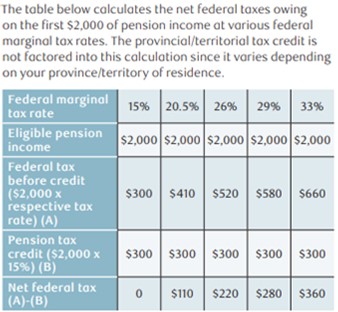In an effort to be tax efficient, a client recently asked if she should transfer a portion of her RRSP to a RRIF in order to generate a RRIF withdrawal of $2,000 that could be covered by a tax credit related to pension income. She was told by her friends that this tax credit would result in the $2,000 withdrawal being tax-free. This question prompted me to reach out to our Financial Advisory Support Team (FAST) to ensure I was equipped to provide our clients with up-to-date information on the current regulations. As it turns out, the advice that my client received from her friends may not have considered the full picture as each individual’s circumstances are different and the amount of tax saved can vary.
There are many types of pension income that can qualify for the tax credit. (For a complete list, please click here). As mentioned above, any RRIF income, as reported in one’s T4RIF, is considered an eligible pension income. However, if you are receiving a pension income from your employer, then you may already qualify for the credit, and there would be no need to do an early transfer of your RRSP to a RRIF in order to generate pension income. Clients should also be made aware that the potential tax credit is non-refundable, which means one can only benefit from it if you owe income tax. More importantly, even if eligible for the tax credit, the taxes owed may not be fully offset. Table 1 shows the different federal marginal tax rates and the corresponding net federal tax that one would pay on $2,000 of eligible pension income. As depicted below, if one is at the lowest federal marginal tax rate of 15%, their federal tax before the credit would be $300 ($2,000 x 15%). Applying the 15% tax credit ($2,000 x 15%) would result in a net federal tax of $0 ($300 - $300). However, if you are at the highest marginal tax rate of 33%, you would have to pay $660 federal tax before the credit ($2,000 x 33%), and your net federal tax after the tax credit would be $360 ($660 - $300). Hence, in this scenario, the $2,000 pension income is not necessarily “tax-free.” Finally, investors should also consider the tradeoff from exercising an early withdrawal from their RRSP/RRIF, as they are also giving up the potential tax-deferred income and gains in the future on this amount.
Table1

Overall, one is not technically receiving a tax-free amount from their RRSP/RRIF accounts, as the tax credit simply reduces a client’s taxes payable. This is not a deduction from income. Still, if a client does not have other eligible pension income and they have a large RRSP that they want to start liquidating to avoid a large income inclusion on death, they may want to take advantage of this tax credit even if the taxes payable are not fully covered by the tax credit. Keep in mind the tax credit is available each year and does not carry forward. Client’s should speak with a qualified tax advisor to determine whether the pension income tax credit should be used in relation to their personal cash flow, estate, and tax planning needs.
IMPORTANT: The strategies, advice and technical content in this email are provided for the general guidance and benefit of our clients, based on information that we believe to be accurate, but we cannot guarantee its accuracy or completeness. Readers should consult their own lawyer, accountant or other professional advisor when planning to implement a strategy. This will ensure that their own circumstances have been considered properly and that action is taken on the latest available information. Interest rates, market conditions, tax rules, and other investment factors are subject to change. Please note that the content referred to in this e-mail may not contain appropriate branding and disclaimers and that you are responsible for ensuring that the compliance guidelines specific to your role within RBC financial group are adhered to.
IRS Circular 230 Disclosure: RBC and its affiliates do not provide tax advice. Any discussion of US tax matters in this communication (including any attachments) cannot be used for the purpose of avoiding tax penalties.
